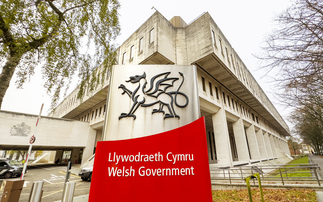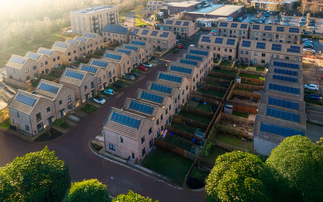It is easy to feel deflated after another UN Climate Summit failed to deliver the ambitious pledges that are required, but read between the lines and the signals for business leaders are hugely encouraging
It is easy to succumb to despair in the wake of the UN's annual climate summits. As the gavel comes down, the avalanche of pre-prepared statements is released and for every line praising welcome progress there are two more reminding people that what little headway has been made is woefully inadequate in the face of the climate change threat.
"Inadequate," says Lord Stern. "Very dangerous," warns Johan Rockstrom. "We cannot solve a crisis without treating it as a crisis," declares Greta Thunberg. "I know," thinks the UK government. "Two days after the Summit closes lets unveil an expansionist new aviation strategy that largely glosses over the scale of the climate challenge."
The narrow technical breakthroughs delivered in Katowice pale in comparison to the stark warnings that global greenhouse gas emissions are rising again. The dense legalese of the treaty rulebooks and political accords sometimes feel like we've called 999 to report a wildfire and the government has closed the fire station and sent a chartered accountant to help. David Attenborough warns that climate change is tearing at the very fabric of civilisation and world leaders respond with an unresolved row over the intricate rules governing carbon offsets. It would be understandable if many of the sleep-deprived delegates gathered in Katowice travelled home with a nagging sense of ennui packed in their luggage alongside their souvenir lumps of Polish coal.
And yet the temptation to condemn the UN process in general and the Katowice Summit in particular as a derisory, under-powered contribution to global efforts to tackle the climate crisis fail to acknowledge the Paris Agreement's core role as an investment signal. Yes, the sum total of the pledges made under the Paris Accord may still point to more than 3C of warming this century, and yes the international coalition that gave us the treaty may be fraying at the edges, but saying we are on track for dangerous levels of warming is like saying Burnley are on track to get relegated - it's not decided yet; things can change.
If business leaders look beyond the fine-point detail of the COP24 negotiating text the signal from the Summit was clear: things are changing and that change is set to accelerate. Indeed, the Paris Agreement and its 'review and ratchet' mechanisms is designed to ensure that is precisely what happens.
The signal was there in the text itself. Despite a wilfully antagonistic stance from the US, Russia, Saudi Arabia, Kuwait, and Brazil, the talks did not collapse. Instead they delivered a near superhuman effort to condense hundreds of pages of square bracket-strewn confusion into a workable Rulebook that should broadly standardise the process of submitting and reporting on national climate action plans. Crucially, the Rulebook reasserts the principle of universality - with differentiated expectations based on country's capabilities - that is so important to ensuring a post-Trump US could re-enter the Agreement.
The language on how ambitious those future climate action plans should be and how seriously governments should take the terrifying warnings from the IPCC report on the dangers of more than 1.5C of warming may have constituted an unsatisfactory fudge, but equally it is clear countries are expected to update their plans before 2020 ahead of a formal stocktake in 2023. Some governments will no doubt ignore this expectation or once again submit woefully inadequate plans. But at the same time many of the world's most powerful economies let it be known they will come forward with more ambitious goals and strategies within the next 24 months.
The entire High Ambition Coalition - including the EU, UK, Germany, France, Argentina, Mexico, Canada, and a raft of smaller developing economies - confirmed it would "step up" ambition before the decade is out. India and Ukraine did likewise. China backed the Rulebook and played a notably supportive role in ensuring the customary rows over the delineation between richer and poorer nations did not get out of hand. A host of new countries and regions signed up to the Powering Past Coal Alliance, including Scotland, Israel, Senegal, and the coal-reliant Australian cities of Sydney and Melbourne.
Business leaders planning their strategies and investments for the next five years know that regardless of whether or not Presidents Trump and Bolsonaro intensify their opposition to the Paris Agreement, many of the world's largest, trend-setting economies, are only going to strengthen their decarbonisation policies in the next two years. The bar that the IPCC report has set for them to pass is a credible trajectory for getting delivering net zero emission economies by mid-century. A growing number of governments are committed to trying to clear that bar.
Moreover, a 2020 strengthening of national climate action plans - or NDCs in the UN jargon - is set to work in conjunction with established and accelerating investment and technology trends. For example, COP24 saw confirmation over 1,000 financial institutions with almost $8tr of managed assets have now made fossil fuel divestment pledges; news the European Bank for Reconstruction and Development (EBRD) will no longer finance coal projects in any circumstances; a commitment from shipping giant Maersk to become a net zero emission business by 2050; plans from Shell to link executive pay to climate targets; and the unveiling of a £170m UK plan to build the world's first net zero emission industrial hub.
Broader still, the beefing up of NDCs in 2020 will coincide almost perfectly with ever more credible projections that the 2020s will be the decade when increasingly mature clean technologies undercut incumbent polluting infrastructure. New renewables projects are already undercutting existing fossil fuel power plants in many markets and costs are on track to keep falling, storage costs are also falling fast, coal is under intense pressure in many regions, and electric vehicle costs are dropping at the same time as ranges increase. The Polish Presidency's focus on a 'just transition' may have been dismissed in some quarters as a cynical attempt to protect the coal industry, but against this backdrop of accelerating technology transformation a growing number of governments are finally starting to recognise that proper planning to help high carbon industries transform is a political necessity.
As the influential commentator Michael Liebreich observed in a must-read piece on the eve of the COP24 Summit, one way or another the 2020s will prove a critical decade in the fight against climate change and business leaders have just 12 years - or two business investment cycles - to position themselves. "In just two business cycles - well within the range of our remaining careers - we will find ourselves in a world where either carbon emissions are dramatically lower, or there will be no remaining carbon budget, and presumably no societal license to operate carbon-intensive businesses," he warned. "Once you accept that the world is going to look very different at the end of the next two business cycles, whether we listen to the warnings of scientists or not, priorities become refreshingly clear."
The Agreement brokered in Katowice provided yet more of that refreshing clarity, confirming that the vast majority of the world's governments want these business cycles to play out in a low carbon direction - and are prepared to take increasingly bold steps to nudge them along a sustainable trajectory.
This sense of change on the horizon was further amplified by some of the rhetoric on offer in Poland. The oldest and youngest speakers at the Summit each provided evidence of how public engagement with climate threats is shifting. David Attenborough declared that "if we don't take action, the collapse of our civilisations and the extinction of much of the natural world is on the horizon". And instead of the standard right-wing media howls of outrage about apocalyptic doom-mongering, protests came there none. Record-breaking heatwaves and the ever more tangible sense of 'global heating' makes blind dismissal of these threats ever harder to sustain in the court of public opinion.
And then there was Greta. The 15 year-old Swedish schoolgirl Greta Thunberg speech to the main plenary hall was a tour de force of accusatory rhetorical power. "You are not mature enough to tell it like it is," she told her silent elders. "Even that burden you leave to us children." Ouch.
'You are not mature enough to tell it like it is.' — Watch this 15-year-old's searing callout of nearly 200 countries for their lack of action on climate change pic.twitter.com/qjUa046nS2
— NowThis (@nowthisnews) December 16, 2018
"You say you love your children above all else, and yet you are stealing their future in front of their very eyes," she continued. "Until you start focusing on what needs to be done rather than what is politically possible there is no hope. We cannot solve a crisis without treating it as a crisis… If solutions within this system are so impossible to find, then maybe we should change the system itself."
That sound you can hear is a match being taken to the license to operate of polluting firms everywhere.
Throughout the Summit the rhetoric and messaging in support of bolder climate action sounded more coherent, resonant, and powerful than it has ever been, leaving the pollutocrat defenders of continued fossil fuel expansion sounding ever more isolated and cynical. The messaging from the IPCC also shifted effectively, away from the self-defeating focus on '12 years to save the planet' and towards the refreshingly blunt: "Every action matters. Every bit of warming matters. Every year matters. Every choice matters".
This message is so much better than '12 years left to stop global warming' pic.twitter.com/tyl6Q9Xsw2
— Eric Herring (@eric_herring) December 15, 2018
Inevitably, there is still plenty of room for trouble ahead. The Saudis and the Trump administration will be back next year, with a likely ally in the form of Brazil's new climate sceptic, Paris Agreement-baiting President Bolsonaro. The decision to kick the section of the Rulebook covering carbon markets into next year may have been inevitable, but it provides a thread for opponents of the treaty to pull at before it comes into full effect in 2020.
The 2020 Summit, potentially in London, is now shaping up to be one of the most important gatherings in the history of human civilisation. The point at which the world either opts to drastically accelerate decarbonisation efforts just before it is too late, or the trigger for a second term Trump Presidency and its pollutocrat allies to relegate the world to a future of genuinely dangerous climate change.
Will we succeed in holding temperature increases below 1.5C or even 2C? Can a net zero emission economy be built within 30 years when greenhouse gas emissions are even now still rising? It remains the longest of long shots. But the signal from Katowice is that the vast majority of governments are still committed to giving it a right good go. The question for business leaders is do you want to continue with the high carbon relegation form or do you want to be part of the green fightback? There are only two more business cycles to decide and the world is going to change fast around you regardless of which path you opt for.
As it is nearly Christmas, perhaps it is best to close with a quote from Dickens: "Change begets change. Nothing propagates so fast."










